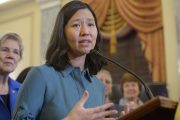
Speaking at the Congressional Hispanic Caucus Institute’s 37th Annual Awards Gala in Washington on October 2, President Obama gave a rousing “get out the vote” speech, imploring this audience: “Si, se puede … si votamos. Yes we can … if we vote.”
Early in his talk, Obama gave “a special thanks” to two young men who rode over with him from the White House. Named Luis and Victor, he identified them as CHCI (Congressional Hispanic Caucus Institute) interns and fellows.
He went on to explain: “They are also DREAMers, living and working in the country they call home, and making it a better place for all of us.”
While the term “DREAMers” was undoubtedly familiar to almost everyone present at the event, a little background is necessary for those who may not recognize it.
DREAM — the Development, Relief, and Education for Alien Minors Act — was introduced in the Senate in 2001.
Varying versions of the DREAM Act were introduced in the 107th through 111th Congresses, and President Obama supported the 2011 version of the bill as part of his efforts to accomplish “immigration reform.” Though the legislation had not passed, on June 15, 2012, Obama announced that his administration would stop deporting young illegal immigrants who met certain criteria previously proposed under the DREAM Act.
The Obama administration policy to implement DREAM by executive action is known as Deferred Action for Child Arrivals (DACA).
DACA is a memorandum authored by the Obama administration on June 15, 2012 and subsequently implemented by then-Secretary of the Department of Homeland Security Janet Napolitano. It directs U.S. Customs and Border Protection (CBP), U.S. Citizenship and Immigration Services (USCIS), and U.S. Immigration and Customs Enforcement (ICE), to practice “prosecutorial discretion” toward some individuals who were brought to this country illegally as children and have remained in the country illegally.
“Prosecutorial discretion” is, for all practical purposes, amnesty.
The DACA executive action met with some resistance, however. In August 2012, 10 ICE agents sued DHS Secretary Janet Napolitano, saying the directive forced them to break the law and ignore their duties.
The Obama speech amounted to unabashed politicking, not surprising since all 27 members of the Congressional Hispanic Caucus are Democrats. Referring to the bipartisan “Gang of Eight” “immigration reform” bill that passed the Senate on June 27, 2013, Obama said:
You know that we’ve done it [taken actions so far] despite what is possibly the most uncooperative House of Representatives in history. (Applause.) If House Republicans brought the Senate bill up for a vote today, it would pass today; I would sign it today. And they know it. (Applause.) But instead, they’ve been sitting on it for more than a year. They voted to strip DREAMers of new protections and make them eligible for deportation — not once, but twice they voted that way.
Obama also bragged about his administration’s assault on states’ rights: “When states like Alabama and Arizona passed some of the harshest immigration laws in history [Ala. H.B. 56 and Ariz. S.B. 1070], my Attorney General [Eric Holder] took them on in court and we won.”
(Note: Because of his refusal to meet the documentation demands of the Fast and Furious investigation, Holder became the only Cabinet member in U.S. history to be held in contempt of Congress.)
S.B. 1070 made it a state misdemeanor for individuals to be in Arizona without the required identification documents, barred state or local officials and agencies from restricting enforcement of federal immigration laws, and cracked down on those transporting, sheltering, and hiring illegal immigrants — practices already prohibited under federal immigration laws.
H.B. 56, like S.B. 1070, granted law-enforcement authorities the power to verify the immigration status of anyone detained on other charges and suspected of being illegally present in the United States. In a decision in 2011, Judge Sharon Blackburn of the Northern District of Alabama upheld six sections of H.B. 56 and enjoined four, not exactly a “win” for the administration.
Obama also bragged about his commitment to circumvent the separation of powers by implementing by executive action policies that rightfully should be approved by the legislative branch:
I’ve said before that if Congress failed to live up to its responsibilities to solve this problem, I would act to fix as much of our immigration system as I can on my own, and I meant what I said. So this is not a question of if, but when.
Obama initially made his intention to implement immigration policy unilaterally last June 30, when he said:
I have also directed [Department of Homeland Security] Secretary [Jeh] Johnson and Attorney General [Eric] Holder to identify additional actions my administration can take on our own, within my existing legal authorities, to do what Congress refuses to do and fix as much of our immigration system as we can. If Congress will not do their job, at least we can do ours. I expect their recommendations before the end of summer and I intend to adopt those recommendations without further delay.
However, the realities of politics got in the way of “without further delay.” The administration came to realize that whatever action the president might have taken prior to the elections would be politically hazardous to Democrats in Congress facing election. Of special concern to Democrats is retaining control of the Senate, which Republicans can grab by picking up a net six seats.
With this reality in mind, the White House issued an e-mail statement to major news organization on September 6 stating that President Obama “believes it would be harmful” to his immigration policy to announce any administrative action on immigration before this November’s elections. However, noted the statement, “The President will take action on immigration before the end of the year.”
Predictably, the statement blamed “the Republicans’ extreme politicization of this issue” for his delay on following through on his previously promised executive actions, offering as an example: “We have seen how Republicans have fought hard to exploit the humanitarian situation at the Rio Grande Valley.”
Apparently, the president’s cheerleader-style statements to the Congressional Hispanic Caucus are not regarded as “politicization of this issue.”
What the White House realizes, unquestionably, is the importance of the Hispanic vote to the Democratic Party’s chances of retaining control of the Senate. The president’s decision to delay any action on immigration until after the election may have helped the Democrats’ prospects among non-Hispanic voters, but it created problems with the Hispanic electorate.
Following the September statement, Arturo Carmona, the executive director of Presente.org (whose mission is “to advance Latino power and create winning campaigns that amplify Latino voices”) called Obama’s turnabout “a betrayal” of the Latino community and “shameful.” Carmona said the president “is once again demonstrating that for him, politics come before the lives of Latino and immigrant families.”
Several members of the Congressional Hispanic Caucus expressed dissatisfaction with the announcement. Senator Robert Menendez (D-N.J.) said he was “deeply disappointed” with the decision.
“Of course there are some politics going on,” Representative Tony Cardenas (D-Calif.) said on CNN’s State of the Union. “I don’t like what the President’s advisers may be telling him.”
Representative Luis Gutierrez (D-Ill.) said Obama’s decision to “play it safe” could tarnish his reputation among many Latino voters in the November elections. “(He’s) walking away from our values and our principles,” Gutierrez said on ABC’s This Week. “Playing it safe might win an election, but it almost never leads to fairness, to justice and to good public policy that you can be proud of. While we wait until November … there’s going to be another 60,000 people deported. There is pain and suffering in the community, and there is a lot of anguish and anger.”
Obama’s address to the Congressional Hispanic Caucus Institute’s Gala was an obvious attempt to build bridges and mollify that “anguish and anger.” His speech included a rousing “get out and vote” plea:
You already know how powerful the Latino vote can be. (Applause.) In 2012, Latinos voted in record numbers. The next day, even Sean Hannity changed his mind and decided immigration reform was a good idea. (Laughter.) But despite that record-breaking turnout, only 48 percent of Hispanic voters turned out. Fewer than half. Fewer than half. So the clearest path to change is to change that number. Si, se puede … si votamos. Yes we can … if we vote.
Related articles:
Obama Delays Immigration Action Until After Elections
Obama Executive Action Will Allow Illegal Immigrants in Military
More Illegal Alien Children Coming Soon, Predicts Think Tank Spokesman
Estimated Cost of Educating New Illegal Children at $760 Million
Illegal Immigrant Kids May Overwhelm U.S. Schools
Illegal Immigrant Children Fail to Show at Immigration Hearingsi
Relocation of Illegal Immigrant Minors Stirs Negative Reaction
Feds Sending Illegal Immigrant Minors to States Without Notice
Texas Sheriff: Groups of Armed Illegal Immigrants in His County
DHS: Flow of Illegal Immigrants Encouraged by U.S. Failure to Deport




